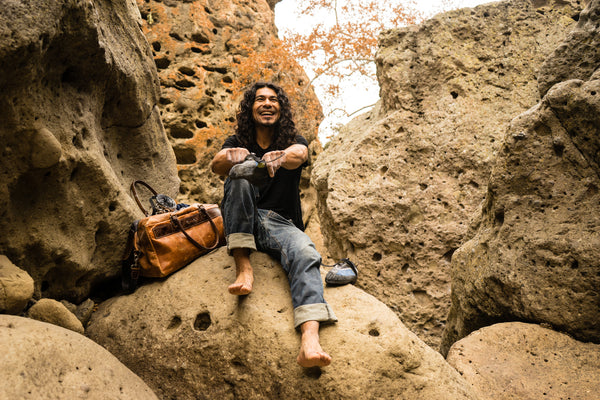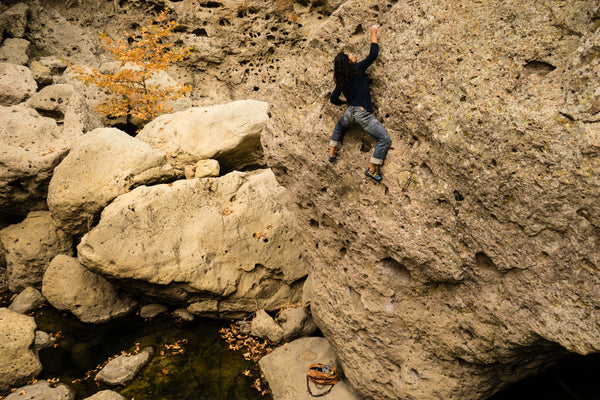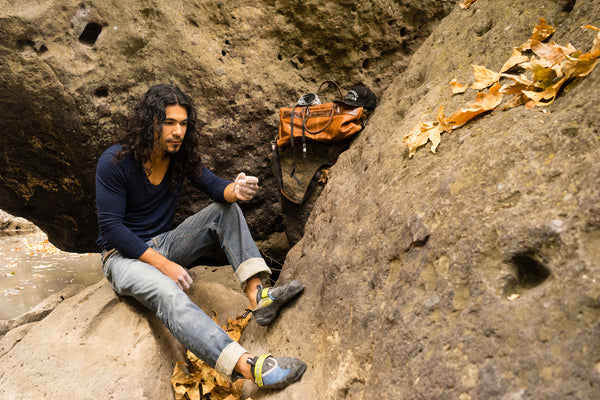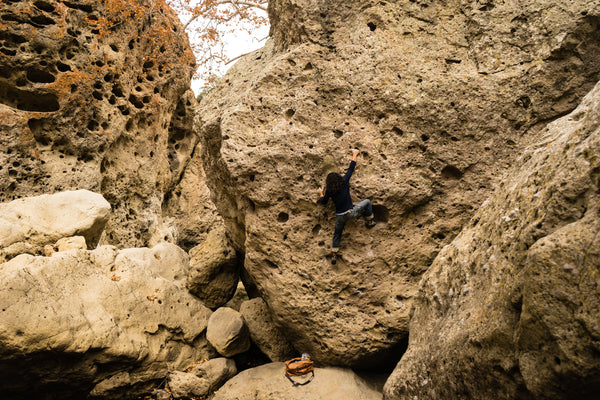
Norman is a coach that has a dramatic sincerity to his approach - it's not about his ego's success as a coach - his motivation is helping his clients succeed.
Interview: Alex McAfee - Photos: Cody Chouinard
I first met Norman after moving to Venice a few years back. He's one of those chill guys with a laid back surfer's vibe until the subject of climbing, music, art, or skateboarding comes up--then his eyes light up with a passion that you can tell has always just been sitting beneath the surface. Along the last few years I've also see him almost weekly at Rockreation coaching kids and adults. He's the type of coach that you can tell has a dramatic sincerity about his approach--it's not about him succeeding as a coach, his motivation is seeing his clients and students succeed through his coaching.
Alex: Hi Norman, thanks for being here. So, you're a climbing coach; explain to everybody out there what a climbing coach is, or what your approach is to being a climbing coach.
Norman: A climbing coach to me, pretty much is someone who is available or has information that can help someone achieve their particular goal--whether it some indoor sort of goal they have, or an outdoor goal they are achieving or need to complete.
A: How did you start climbing?
N: I was introduced to climbing by a friend of mine. I was still in school and I was looking for talent and found this guy, Tyler Stokes - who was an actor. He became the lead in my thirty-second spot. Later on, we bumped into each other in Venice Beach and he said, "Hey I’m looking for a climbing partner – going out to Joshua Tree this weekend; are you free?" I said to him, “I’ve never rock-climbed, I don’t know what you’re talking about, but I am free this weekend.” That’s actually how I got introduced to rock climbing. I wanted to help a friend of mine achieve his goals that he had since he was a kid, since he was 16, dreaming in Utah of going to Joshua Tree and becoming a Stone Master.

A: So the first time you went out, were you good at it? Were you talented at rock climbing?
N: I would say that the entire experience from hiking to climbing to sleeping under the stars before climbing in the morning was so foreign to me that I can’t tell you whether I was good or bad at rock climbing. All I know is that I just fell in love with it right away – the whole nine yards.
A: Like the adventure of being outside?
N: The adventure, being outside, sleeping on the ground, just like waking up, making oatmeal in the morning, eating a banana, climbing all day and just living, you know, back in the day more than not on just Clif Bars--but Snickers bars, and any kind of candy bar that had protein in it.

A: How did you go from when you started climbing and just going out with your friends, to becoming a sponsored athlete and a coach.
N: Pretty much it was that many years. It was about 5-6 years ago, I was 18, so maybe 12 years ago – 13 years ago and then I was introduced to rock climbing and this is how I was introduced to rock climbing. Five – six years later, that best friend of mine Tyler Stokes, who introduced me to rock climbing, actually passed away in a climbing accident so that took me away from rock climbing. Because I had so many peers and friends that were in the community and loved rock climbing and knew what it meant to me, they said come out and just like have some fun, and you know whatever. That actually led to me then re-kindling my love for rock climbing. Around the age 25-26, I wanted to actually focus on something. I felt that I was jumping around, whether I had success or not in life, it was not because I really worked hard for it, it was because maybe I was in the right place at the right time. So I wanted to work towards something and that was rock climbing. Within five years, I became a youth national competitive coach, coached young people on to the U.S. National Team, achieved my personal climbing goals, and that pretty much spurred and opened the door to where we are right now. And, it just started with pretty much making sure that I kept my promise to Tyler - that through rock climbing he would always live through me.

A: Can you talk about your approach to coaching? You seem to be successful at it. What sets you apart?
N: One of the things is that I feel like I have a very good community. So it’s almost like again, recognizing that I am in the right place at the right time. This is Southern California, there are a lot of kids and a lot of people here that do the outdoors. So that’s what’s has allowed me to actually even be in people’s minds. But I find that what really separates me is this notion that… I feel that all of us have the inner strength of physical strength to do what we want to do, but we don’t actually always have the mental capabilities or actual ability to connect our mind and body. So what I try to help everyone understand, based on physics or what I consider to be geometry and mathematics, and simple stuff like that. I simplify all that and try to help them understand there is an efficient way to everything in life, and also any given move. So most of us assume that we need to get stronger, but I feel that if we just became wiser, we wouldn’t have to work as hard as some of us do.
A: If you are working with a client and they have some sort of mental block around that idea, is there a way that you can help them move through that?
N: Yes, one of the ways that I help them understand the notion between whether you can physically do it, or mentally you’re having a block, is actually breaking down the specific problem--just one section of the climb that’s giving them a problem. So, instead of, like I was saying, instead of eating the entire cake – you could eat the entire cake, but just take it one bite at a time. It’s really hard to just stuff your face with the entire cake at one time. So I like to just break down that specific section or sometimes even move. Then using their personal finger strength, body length and type of flexibility, help them understand how and what their body needs to do in order for them to achieve that move. That goes aside from the physical strength; just helping to understand where their body needs to be placed rather than just pulling harder in most cases.
A: Do you use any type of visualization with your clients?
N: I do. I honestly ask them to visualize. One of the things I try to do is take my experience, and instead of telling the person to do this because it worked for me once upon a time, I help them sort of understand what the forces at play are. For example, one of the things that I feel coaches never discuss is the effects of gravity that we have. Instead of fighting gravity, I want to help people understand that there is a symbiosis with gravity...What was the question again?
A: Visualization.
N: The question is about visualization the answer is yes. The way I help them visualize is pretty much I explain to them physically what their body has to do, and then I ask them to actually feel what I want them to understand. I use a lot of words, but I essentially want them to feel the balance rather than the strength involved.
A: I’ve heard Tony Robbins talk about that when he was coaching Andre Agassi to get his swing back, Tony talked to Agassi about what it felt like to do the perfect swing. Can you talk about what you were like before you started climbing and has climbing changed you or how you approach life?
N: I feel that climbing has absolutely changed my life, which is the reason why I fell in love with it. I really attribute, myself prior to rock climbing, to being a classically Type-A personality in which you have a goal, you work towards it, you achieve it, you become bored, so you do that whole routine again. You get a goal, achieve it, get bored, and over and over again. Rock climbing was the first thing in my young life that was really truly obvious that there was no end to your challenge as long as you still cared to be challenged. There was always going to be a harder move, there was always going to be a smaller hold, there was always going to be a taller route from whatever you just did. It is just something until I die--I find rock climbing will always be able to teach me something. That is really what I would like to do, is that, in any and all lessons that the mountain has taught me, the way that I’d like to give back to the community and stay humble is through teaching and sharing what the mountain has meant to me.

A: Let me shift gears for a moment. Let’s talk about coaching for a competition. Climbing outside or climbing for yourself is different from a competition when there is an audience, there is pressure--a winner and a loser. How do you prepare your clients for that?
N: One of the things I like to do, especially if you understand the formats that rock climbing competitions are done, is that at the end of the day, the person who you are in the same category with, and for all intended purposes are competing against, they can’t hinder you or help you. It’s you and your movement, it’s you and the wall, it’s you and the climb. So that way, I always let them essentially relax--my students and my clients in the competition realm. It is pretty much letting them know that they’re in control. If you’re thinking about the fall, you’re going to fall. If you’re thinking about success, you might fall – you will be surprised, but you definitely won’t fall as soon as you thought you were. They’ve got to always think about what I asked them to do, that is confidence. It’s like, you can do it, there's no reason you can’t, because no one is invited to nationals because they’re cute, it’s because they’re capable.
A: Anything else you’d like to say before we take off.
N: Always remember, at least for me, that if we shy away from challenges, we won’t ever truly succeed or actually gain the knowledge that we’re capable of having. If we sit on our asses and wait for information for us to climb El Capitan, it’s not going to happen because El Cap isn't coming to us...we have to go to it. We have to learn about El Cap, and the way it is; and within collecting information, within the experience, you actually will find that you are so much more capable than you ever thought you were!


